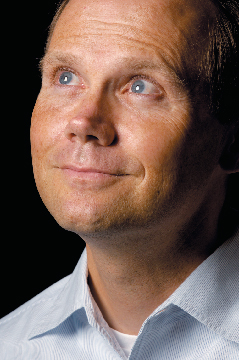|
||
      |
Features ::
Glimpses
Joe Mansueto, AB’78, MBA’80, chairman and CEO of Morningstar, Inc., has had a busy year. Besides taking his $1.1 billion investment-research firm public in May, he added a new industry to his personal portfolio—magazines. In June Mansueto bought business pubs Inc. and Fast Company from Gruner + Jahr Publishing after becoming a 50-percent owner in TimeOut Chicago, launched this past March. “I’m kind of a magazine junkie,” he admits, listing off as favorites Architectural Digest, Dwell, the New Yorker, and Vanity Fair in addition to work-related reads such as Forbes, Fortune, and the Economist. While Morningstar remains his passion, the newly acquired publications, he says, are “a fun, extracurricular activity—and hopefully a profitable one.”
 Magazines
weren’t the only 2005 additions to Mansueto’s life. In August
he and wife Rika Yoshida, AB’91, a former Morningstar stock analyst,
had their third child.
Magazines
weren’t the only 2005 additions to Mansueto’s life. In August
he and wife Rika Yoshida, AB’91, a former Morningstar stock analyst,
had their third child.
A star is born: The initial idea for Morningstar was to bring the same kind of in-depth, comprehensive information available on stocks to mutual-fund investors. When I looked at the mutual-fund world it seemed odd that they had little more than one line on total returns. I had been working as a stock analyst, and I’d look at the quarterly reports and letters from great investors like John Templeton and Ralph Wenger. I thought, wouldn’t it be great if someone would compile these into a compendium? I could see that mutual funds were growing. In 1984 I left my job and started Morningstar in my one-bedroom, Lincoln Park apartment. The PC had been introduced a couple years earlier, so I bought three or four and started entering the data. In six months I created our first publication.
The Thoreau-Buffett influence: The name Morningstar comes from the last line of Thoreau’s Walden: “The sun is but a morning star.” Walden was one of first books I read at University of Chicago, my first year in the College, in Western Civ class. It’s all about independence, self-reliance, and thrift. Those seemed like good qualities for a company to embody.
I’m a huge fan of Warren Buffett; he’s the best investment mind of our times. Early on he was the one who got me excited in investing and business. I came across him in the late ’70s and read all his Berkshire Hathaway reports. His approach to investing made a lot of sense to me, and he does it with humor and ethics and integrity.
Advantage independence: Inc. and Fast Company came up for sale in a very unusual circumstance. G + J announced they were leaving the U.S. magazine business—in one month. That gave me an advantage. I didn’t have to get approval from a board of directors or do any of the other things a bigger company would have to do that take a lot of time.
I’ve read both these publications since they were started. Inc. is the voice of the entrepreneur. That holds a special place in my heart. Entrepreneurship is at the center of capitalism, creating change, creating jobs. It’s a powerful force. I really believe in Inc.’s mission and what it’s about. Fast Company is also a magazine with a very strong mission, created for people who are passionate about their work and want to do it better. These are not just magazines, but they also have missions—just like Morningstar has a mission.
Plenty of room in the fold: Morningstar remains my number-one passion and interest. I’m totally interested in seeing Morningstar succeed. There’s a CEO of these magazines running them day-to-day. I’m not answering the letters to the editor—I’m involved on a board-operating level. It’s always good to grow and learn about other businesses.